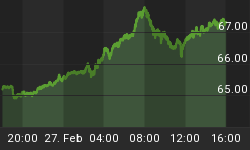Not many people are attuned to just how important the entry point is to success in financial markets. The entire trajectory of your position is based on when you choose to enter. In markets, it is all about the entry.
It's quite similar to the physics of platform diving, which will soon be in the news with the summer Olympics only weeks away. The entire energy of a dive is imparted at the moment of take-off, as the trajectory and angular momentum of the diver cannot be altered once the jump has been initiated.
In markets, the entire trajectory of a position cannot be altered after initiation, in a remarkably similar way to a diver plunging to the pool below. If the initial energy is wrong, there is little that can be done to fix it once the process is underway.
There is still the illusion of free will and choice in markets, as it's nominally true that you can exit a position "whenever you want." But your exit is never entirely on your own terms, even in the best circumstances. The success or failure of your position -- and thus, your exit -- is always dictated by what the market has done to your position. You really didn't have much to do with it, other than choosing your entry point.
It is precisely this lack of true free will that leads to predictability and structure in financial markets, and why market price action is decidedly non-random, despite the wrong-headed assumptions of academics and economists.
I would even say that market moves are pre-determined to a large degree, exactly similar to the way that forecasters can predict -- days ahead of time -- the precise size and shape of the incoming surf in my hometown of Encinitas California, just from detailed analysis of the storm activity thousands of miles away, in the Gulf of Alaska.
I use a remarkably similar process to forecast price movement, and early this week my "fractal methods" were telling us to watch the SPX 1210 level closely, as this is a critical energy level for the pattern.
Here's an excerpt from the Fractal Market Report, published after the close on Monday:
"There is still a good chance that the SPX is going to crumble further, and the wicked decline off 1440 will end with an old-fashioned washout low. 1210 is a great candidate level to spark this low, and it would be ideal to see the SPX -- or the futures -- overshoot this level to the downside, and then come roaring back up through it.
At this point we're looking for some serious slingshot energy to come back into equities, and for this energy to be sustainable, and not just a momentary reaction.
But if you're more aggressive, and want to take a calculated risk on a strong slingshot rebound, I recommend only doing this at pre-identified major energy levels, such as 1210, as the risk can be controlled much better around these levels.

I've sketched out an entry strategy on a washout low under 1210. If the SPX comes charging back up through this level from below, then I recommend going for it, but only on a small initial long position."
It ended up playing out just like this, with a brief overshoot of 1210, and then a slingshot rebound. There was nothing "random" about it.

Most importantly, the SPX is now only days -- or even hours -- away from triggering the massive buy signal we've been waiting for, as patiently as possible.
The expected decline off 1440 has carried down farther than I had anticipated, but we never got an entry trigger. So when it finally does come -- literally, any hour from now -- it should be especially powerful.
All of the details on this entry trigger are available with a subscription to the Fractal Gold Report, which also includes a daily report on the S&P 500 Index.
As far as gold, after Wednesday's breakdown it is very likely that gold has already put in the top for this phase of the big triangle consolidation, which should still take many more months to play out fully. If this is accurate, then gold will now move down and touch the bottom boundary line of the triangle, or at least move down and go sideways until it "bumps" into this bottom line.
The pattern on the weekly chart is quite clear at this point, so we can expect a move down to at least $930 during this next down phase.

If the corrective phase does not find support at $930, then a move back down to our old friend $891 can be expected. But gold should not really break down below $891 as part of the next phase of this triangle consolidation.

We should also expect one more "bonk" against the top boundary line prior to the definitive breakout that launches gold towards $2,000. On the chart above I've sketched out a likely path for how this should develop, which would be similar to the way gold has behaved during so many of the previous triangle consolidations throughout this uptrend.



I could go on with even more examples of this "3 touch" phenomenon, as triangle consolidations during parabolic up trends almost always have 3 distinct touches of the upper boundary line.
On the fourth attempt, gold should break through, briefly come back down for a final test, and finally zoom away to the upside and never look back.
So the immediate strategy is to stay on the sidelines, or even go short if you're a more aggressive trader, waiting for the next entry signal off the bottom of this triangle consolidation.
Please click here for more information on how you can receive daily updates on gold and the SPX during this crucial period.















